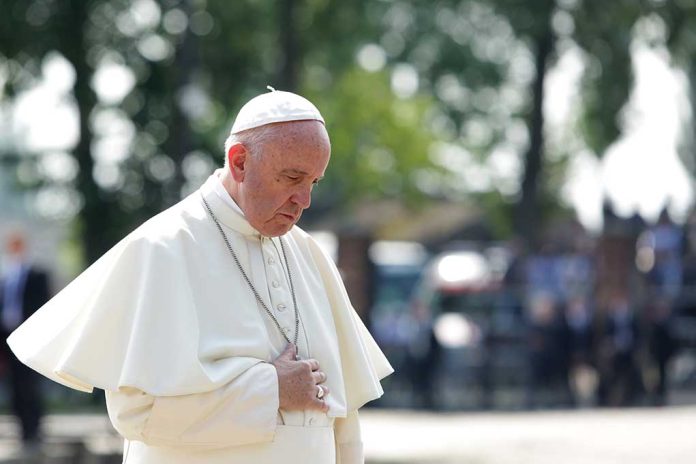
Pope Leo XIV faces mounting pressure to terminate a controversial Vatican-China agreement as ChinaAid reveals shocking escalation in Catholic persecution, including imprisoned bishops, church demolitions, and state-appointed religious leaders operating without papal approval.
Key Takeaways
- Pope Leo XIV must decide whether to renew the controversial 2018 Vatican-China agreement amid growing evidence of religious persecution
- At least 10 Catholic bishops and priests are currently imprisoned or missing in China, with churches being systematically destroyed
- Chinese authorities have unilaterally appointed “bishops” without Vatican approval, directly violating the existing agreement
- ChinaAid reports a violent March 2025 raid on a Catholic prayer site in Shanxi Province resulted in multiple injuries and arrests
- Underground Chinese Catholics reportedly feel betrayed by Vatican silence as persecution intensifies
Vatican’s Controversial China Deal Under Scrutiny
The secretive 2018 agreement between the Holy See and China’s communist government is facing intense criticism as evidence mounts of Beijing’s systematic persecution of Catholics. Pope Leo XIV recently called for prayers for China’s Catholics during the World Day of Prayer for the Church in China, established by Pope Benedict XVI. The agreement, which allows Beijing unprecedented influence in appointing Catholic bishops, was intended to heal the rift between state-sanctioned and underground Catholic churches in China. However, ChinaAid and other religious freedom advocates argue the deal has only emboldened Chinese authorities to intensify religious suppression.
Pope Leo XIV, who now faces the crucial decision of whether to renew this controversial agreement, emphasized the importance of unity for Chinese Catholics. “In the churches and shrines of China and throughout the world, prayers were raised to God as a sign of concern and affection for Chinese Catholics and their communion with the universal church,” stated the Pope in his recent address. However, his diplomatic language stands in stark contrast to the brutal reality documented by human rights organizations operating in the region.
Escalating Persecution and State Control
According to ChinaAid’s comprehensive report, religious persecution in China has dramatically worsened since the Vatican-China agreement was signed. “Since its signing, religious persecution in China, particularly against Catholics, has escalated, not diminished. The Chinese Communist Party (CCP) continues to tighten its control over religious life while the Vatican remains publicly silent,” states the organization’s latest assessment. The report details how the CCP has systematically targeted both official and underground Catholic communities through surveillance, intimidation, forced closures, and arbitrary detention.
“At least 10 bishops and priests are imprisoned or missing. Churches are still being destroyed. Bishop Peter Shao Zhumin vanished after being penalized for conducting Mass without state approval. Meanwhile, the Vatican’s silence has left China’s underground Catholics feeling betrayed,” according to ChinaAid
A particularly disturbing incident occurred on March 23, 2025, when Chinese special police forces raided a Catholic prayer site in Shanxi Province. Eyewitnesses reported that officers violently assaulted congregants who resisted, leaving one man in critical condition. Several worshippers were arrested and their current whereabouts remain unknown. This incident exemplifies the regime’s increasingly aggressive stance toward religious activities conducted outside state-controlled channels.
The Failed Promise of the Vatican-China Agreement
The controversial agreement, which was negotiated by the late ex-cardinal Theodore McCarrick and overseen by Cardinal Pietro Parolin, promised the Vatican would have veto power over bishop appointments while allowing Beijing input in the selection process. In practice, however, Chinese authorities have repeatedly violated these terms by installing bishops without Vatican approval. This unilateral action directly undermines papal authority while forcing Chinese Catholics to accept religious leadership imposed by an atheist communist regime actively hostile to their faith.
“Now is the time for courage. The persecuted do not need appeasement; they need truth, hope, and bold advocacy.” stated by ChinaAid
The persecution extends beyond Catholics to other religious communities in China. Protestants have seen their churches demolished and pastors imprisoned. Uyghur Muslims continue to face mass detention in “re-education” camps. The Chinese government’s broader campaign against faith communities reflects a systematic effort to subordinate all religious expression to communist party control. As Pope Leo XIV weighs the future of Vatican-China relations, the testimony of persecuted believers stands as a powerful indictment of a diplomatic approach that has failed to protect religious liberty while lending legitimacy to oppressors.
A Decisive Moment for Papal Leadership
The ChinaAid appeal represents a critical moment for Pope Leo XIV’s papacy. Having recently formalized his role as Bishop of Rome at the Arch Basilica of St. John Lateran, he now faces perhaps his first major geopolitical test. The Pope has called for Chinese Catholics to be “strong and joyful witnesses of the Gospel, even in the midst of trials,” but critics argue that such encouragement rings hollow without substantive action to hold Chinese authorities accountable for their ongoing persecution of the faithful.
The Vatican’s attempt to improve relations with China, severed over 70 years ago when the Communists took power, appears to have come at the expense of religious freedom. The agreement, which remains secret in its details, has failed to deliver the promised protections for Catholics while providing diplomatic cover for intensified persecution. As evidence of the CCP’s bad faith continues to mount, Pope Leo XIV faces mounting pressure to acknowledge the agreement’s failure and chart a new course that prioritizes the protection of persecuted believers over diplomatic accommodation with their oppressors.



